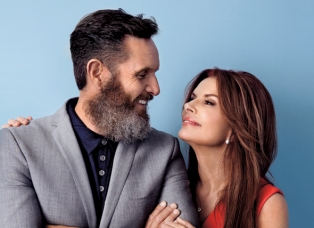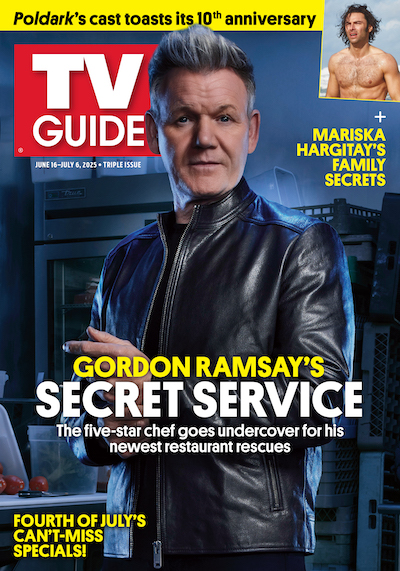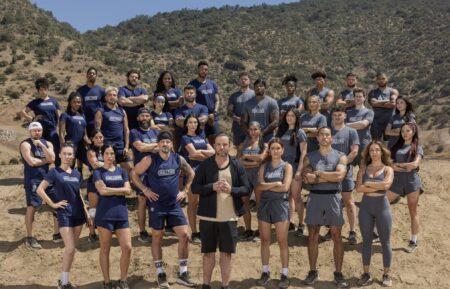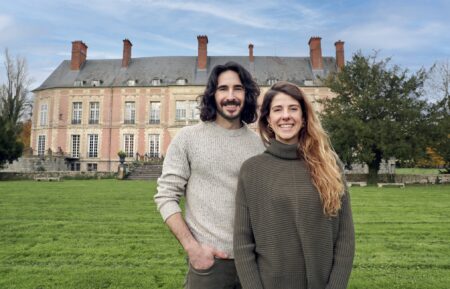Keeping the Faith: The Gospel According to Mark Burnett and Roma Downey

They answer to a much higher power than Hollywood. A.D. executive producers Mark Burnett and Roma Downey–who wooed 100 million viewers worldwide with their History miniseries The Bible–just wrapped Unveiled, a pilot for NBC about guardian angels, and their faith-based World War II saga Little Boy will open in theaters April 24. Now they’re jetting back and forth to Rome for their feature-film remake of the great Christ tale Ben-Hur, produced in partnership with MGM and Paramount. How does this deeply religious duo, who wed in 2007, stay true to both God and the showbiz moneylenders? We found out.
Despite countless dramatic depictions of Christ’s crucifixion and resurrection, A.D. is the first to really explore the decades that followed. Why, after 2,000 years, is this still fresh territory?
Downey: It’s extraordinary, isn’t it? Especially when we know, as believers, that this is just the beginning of the story. One man inspired 12 disciples and they, in record time, brought Rome to its knees. Now there are more than 2 billion Christians in the world. I don’t know why people haven’t seen the drama in that, but we have! It’s riveting.
Burnett: It’s so easy to sum up the years after the Resurrection with: “And then Christianity spread.” But the story of how that happened is magnificent and miraculous and a fantastic time of change for the world.
Downey: You have to remember that the disciples and Mother Mary and Pontius Pilate and the high priest Caiaphas didn’t know they were in the Bible. They don’t know the outcome, so there’s an excitement and intimacy and immediacy to everything that’s going on.
Burnett: And we want to keep coming back every Easter Sunday with more. It would take us 10 seasons just to get from the first persecution of Christians to the Emperor Constantine [under whom Rome began its transformation to Christianity]. So much incredible stuff! We’re already preparing scripts for Season 2.
At this point, do you get any resistance from Hollywood when pitching religious projects?
Burnett: There’s a brand value with Roma and me, just like when you trust certain airlines and hotel chains. The networks and studios know they’re safe with us, and that’s important because it’s very perilous terrain when you go down the Bible road. Look at Noah, with Russell Crowe, and Exodus, with Christian Bale. Both were made by brilliant directors and major movie studios and were very expensive–and neither did well. They would have made money if they stuck to the story.
So even if a religious film has some merit–and Noah and Exodus certainly did–it will be snubbed by the faithful if it veers from the Bible in any way? That seems like a punishing judgment right out of the Old Testament.
Burnett: This is an audience that knows the Bible really well and will reject anything that changes the word of God. They want it authentic. We want it authentic. But you know what? I would feel the same about Shakespeare. Would you change Romeo and Juliet so that the two kids lived at the end? Of course not.
But you’ve created many scenes in A.D. that aren’t in the Bible. How is that OK?
Burnett: We have certain mandatory checkpoints we must honor. For example, we know that Peter denies Christ three times and runs away. But the Bible doesn’t say when Peter ran into John and Mary Magdalene again or what happened when he did. We created that scene and play it as true as we can, running it past church leaders, theologians, and major academics to make sure it resonates.
Downey: The Book is always better, but we’ve done everything we can to take a deeper dive into it and make it relevant. We left for Morocco to film A.D. with a serious charge from our three children. They said, “Do not make this corny. It has to be cool.”
A.D. is pretty much star-free. There was no pressure from NBC to cast name talent?
Burnett: None at all. Hollywood did that for years with its biblical movies, often quite laughably. Seeing John Wayne play the centurion at Christ’s cross in The Greatest Story Ever Told is one of the all-time comedic moments. You don’t need that. The Bible is bigger than any star.
Downey: As a girl, I spent so many rainy Sunday afternoons in my hometown of Derry in Northern Ireland watching the old religious films on TV–The Robe, The Ten Commandments, King of Kings–and even though I was swept up in the miracles, I knew something was off. Everybody looked like they’d just stepped out of the dry cleaners! These stories need grit.
Speaking of miracles, how do you manage to stay happily married and work together? Most couples would kill each other.
Burnett: I can see how it could go wrong. [Laughs] Horribly wrong.
Downey: Even the people closest to us can’t believe it. My women friends are like, “Roma, what are you thinking? We can’t even hang wallpaper with our husbands!”
Burnett: There are hundreds of potential points of conflict in what we do–choices on casting, scripts, shooting, editing. It’s endless. But Roma is a very wise woman who always says, “Between stimulus and response, there is a space.” And we stay in that space as long as necessary.
Downey: Working on these projects has deepened our faith, our marriage, and our friendship. But we’re human. We have disagreements. And sometimes I just have to leave it on the desk, walk away, and go make dinner, because the work is never more important than family and marriage.
Roma, does this mean you’re even OK with Mark’s beard?
Downey: Oh, not at all! I am so over that thing.
Burnett: She’s really been on my case about it.
Downey: It keeps getting bigger and wilder by the minute, but he loves it. [Laughs] I think he’s secretly trying to audition for a role in our next biblical epic.
From TV Guide Magazine
Behind the Scenes With Gordon Ramsay: 20 Years of Cooking Up TV Hits
The celebrity chef reflects on redefining culinary television and his fiery journey Hell’s Kitchen to Secret Service. Read the story now on TV Insider.









